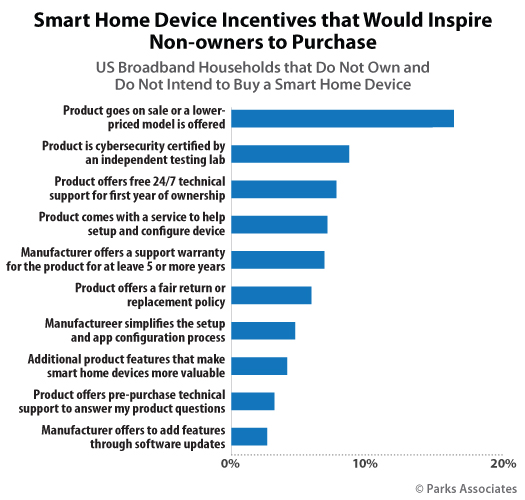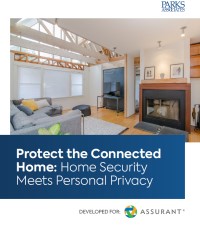Lower prices could add nearly eight million more US broadband households into the smart home market
A new industry report from Parks Associates reveals that among the 42% of US broadband households who do not own and do not plan to buy a smart home device, 17% admit they would likely buy a device if the cost were lower. Capturing these consumers at the right price point would add 7.9 million more households to the population of smart home owners. The report, Breaking Smart Home Barriers: Why Consumers Don't Buy, addresses market barriers and mines consumer fears and presents strategies for addressing or alleviating their concerns in order to expand sales.
“Price is a major barrier to smart home adoption, especially among younger heads of household, who recognize the value but feel priced out of the market,” said Patrice Samuels, Senior Analyst, Parks Associates. “Reducing price while still offering important features is a valuable strategy, with WYZE and Yi Home taking this route. Nest, eufy, and Blink have all released lower-priced versions of their products that include fewer features at a more affordable price.”

In Parks Associates’ Q4 2020 survey, affordability ranks as the most important purchase consideration among purchase intenders. Discounting product prices and bundling products in ways that strengthen value are critical strategies to attract the majority of consumers who rank affordability in their top three purchase considerations. Bundling of smart home devices such as smart plugs, smart light bulbs, or smart thermostats with a smart speaker can introduce the smart home experience to consumers through a leading entertainment device that can be used to stream music and control smart home functions.
More than 50% of US broadband households who do not own or intend to purchase a smart home device report they do not see any benefits to smart home ownership, although this attitude is more prevalent among older consumers.
"Messaging that highlights strong product value helps overcome price sensitivity and counters the perceived lack of a viable value proposition,” Samuels said. “Familiarity with devices is increasing, but value perception is not. Brands must emphasize pragmatic value propositions such as energy savings, loss prevention, and safety to persuade the broad swatch of broadband households that do not see any benefit or value in owning smart home devices.”
Breaking Smart Home Barriers: Why Consumers Don't Buy analyzes factors that contribute to winning companies’ success and projects how current trends may shape future adoption. For more information or to view the Table of Contents, contact [email protected].
To schedule an interview with an analyst or to request specific data, please contact Rosey Ulpino at [email protected] or 972-490-1113.
About Parks Associates: Parks Associates, a woman-founded and certified business, is an internationally recognized market research and consulting company specializing in emerging consumer technology products and services. Founded in 1986, Parks Associates provides business intelligence and research services through its proprietary methodologies developed over decades, including quarterly surveys of 10,000 internet households.
The company's expertise crosses many industries: home security and smart home, streaming video, broadband and pay-TV services, digital media and platforms, gaming, Wi-Fi and home networks, connected health, support, consumer electronics, home control systems, energy management, and tech solutions for the multi-dwelling (MDU), small-to-medium business (SMB), and commercial building markets.
Each year, Parks Associates brings thousands of leaders together for its webinars and annual events. The firm hosts the annual executive research and strategy conferences CONNECTIONS™, Connected Health Summit, Smart Energy Summit, Smart Spaces, and Future of Video. https://www.parksassociates.com
Next: DIY installation of security systems has increased nearly 40% since 2018
Previous: Lights, thermostats, and cameras among top devices consumers want to control via voice






